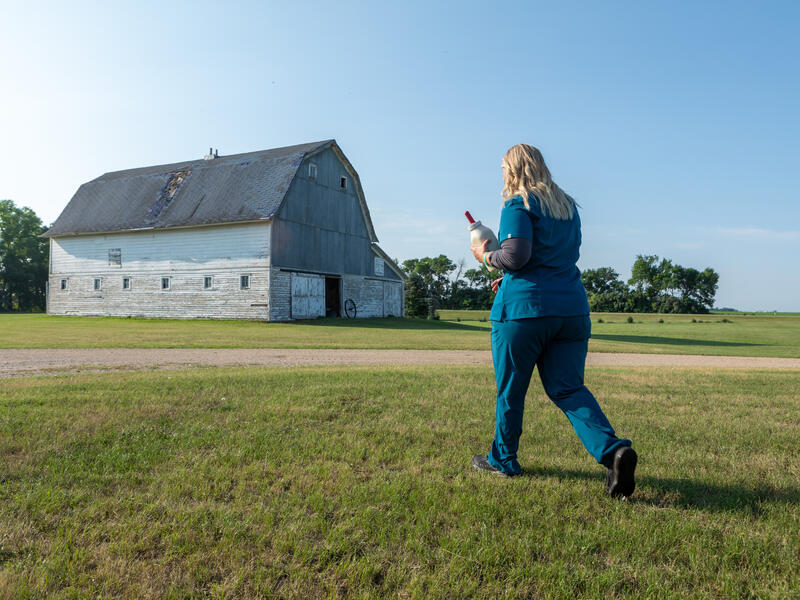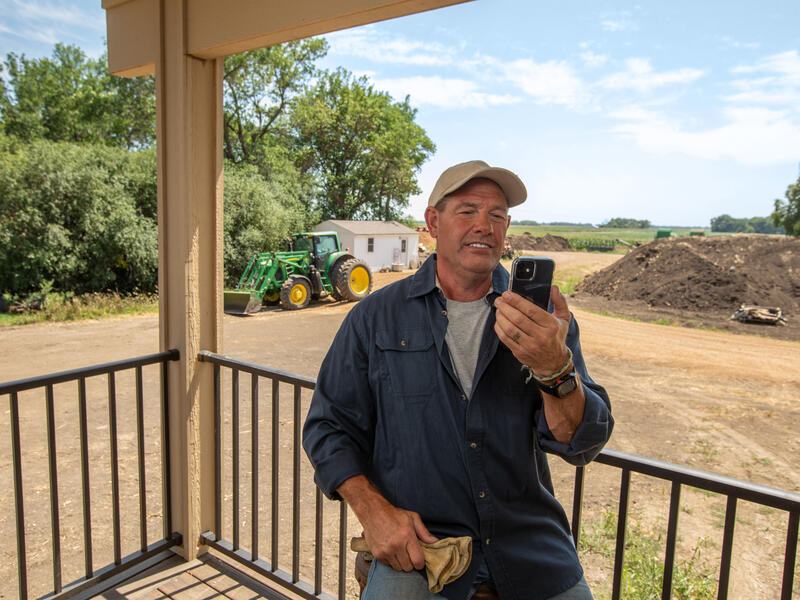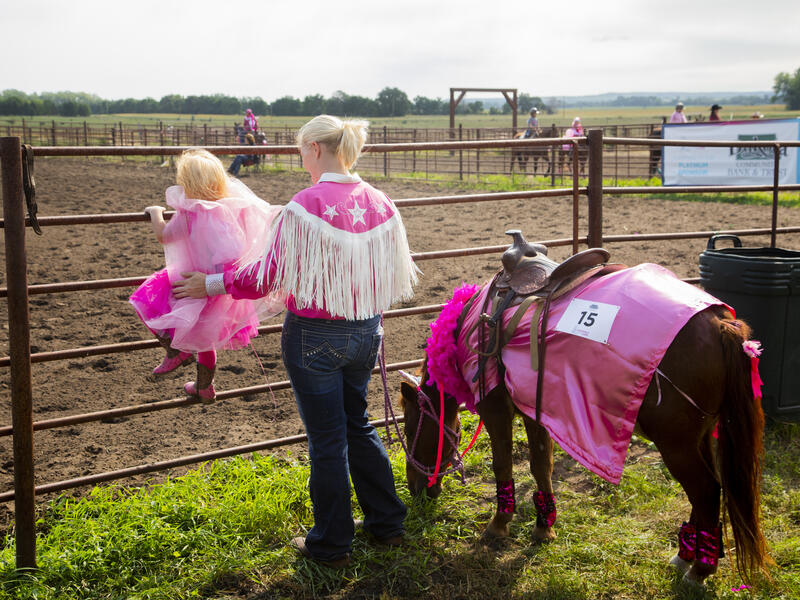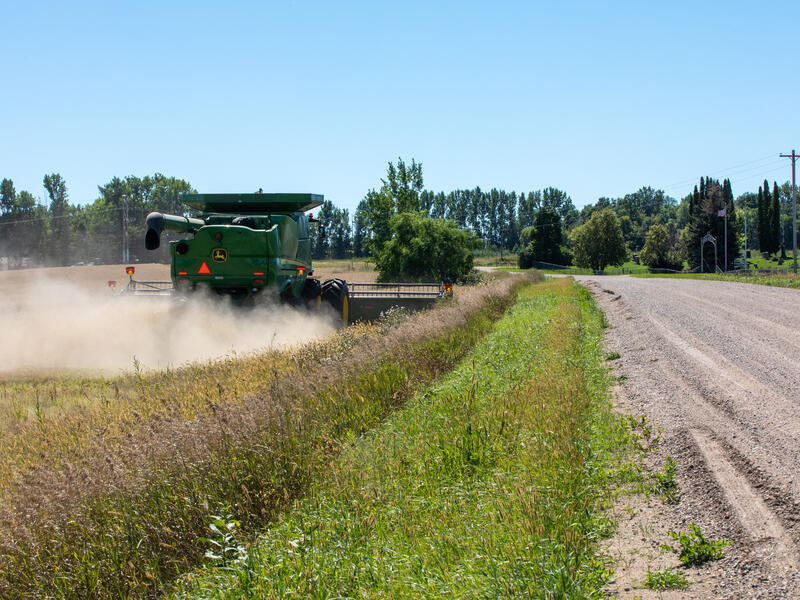If you’re not a farmer, you may not be as directly affected by the spring climate forecast or the commodities markets.
You may not realize how complex the occupation can be, or the amount of pressure and problems farmers can face. Or how isolated they can feel, when every glance out the window reminds them of issues beyond their control.
The world of farming is a world of uncertainty. And when a farmer takes that uncertainty to heart, then they may develop unhealthy ways of coping, said Sanford Health licensed psychologist Jon Ulven, Ph.D.
Mental toll of farming stress
Dr. Ulven and other behavioral health therapists at his Moorhead, Minnesota, clinic see some farmers — but not enough, he said.
“We know, base-rates-wise, that the prevalence of mental health issues, chemical dependency issues, it’s very high for farmers,” Dr. Ulven said. But the number of farming patients getting help from behavioral health providers remains consistently low.
“It’s just a few, and you know the need is greater — much greater,” said Dr. Ulven, who also grew up on a family farm.
Assess your stress: Try our stress response rating tool
He can list a range of physical and mental health effects that the stress of farming can contribute to, including coronary artery disease, type 2 diabetes, orthopedic injuries, anxiety disorders, substance abuse, gambling, marital distress, depression and suicide.
Not every farmer will react to the same situation in the same way, however. Dr. Ulven attributes part of that to genetics.
“Why do some people develop coronary artery disease and some don’t? There’s a genetic predisposition, and some of that comes out in terms of personality,” he said.
“There are some personality types that are more anxious so you might have a predisposition for that, or more of a predisposition to become depressed or even chemically addicted. And then built on top of that predisposition, you need to have early life experiences that create challenge and adversity … often without having a lot of social support.”

Photo by Travis Jensen, Sanford Health
Barriers to getting help
In the past two decades, suicide rates have been consistently higher in rural America than in urban America, the Centers for Disease Control and Prevention said. Between 2000-2020, suicide rates increased 46% in non-metro areas compared to 27.3% in metro areas.
The CDC found the following reasons people in rural areas are more at risk for suicide:
- Living in an isolated location, which may reduce people’s sense of connectedness
- Difficulty getting mental health services due to cost, lack of transportation, and other distance-related issues
- Economic factors, such as unemployment and being in persistent poverty
- Cultural factors that increase mental illness stigma and prevent help-seeking, including a culture of stoicism (particularly for males)
Even farmers who visit a psychologist such as Dr. Ulven face the challenge of making it to appointments.
“I would have people call in and cancel and say, ‘I got to be out in the field. I can’t do this today.’”
And Dr. Ulven completely understands and supports their decision. “But in the meantime, it doesn’t help them get the care they need,” he said.
Identifying who needs help
Dr. Ulven points out some key behavioral health markers to watch for in farmers who are struggling with stress.
“Things like chronic pain are highly associated with some difficulties with depression,” he said. “So that’s a really good thing to check in with them about how they’re doing.”
An increase in substance use is another — averaging a higher number of drinks in a day than before, for example.
You can ask how well the person is sleeping. Worry tends to shorten nighttimes.
“If you think about that as a farmer, that can be potentially deadly to be sleep-deprived,” Dr. Ulven said.
Changes in diet and weight are another sign to watch for, he said, citing a study that found one-third of people eat less under stress, while two-thirds eat more.
Also pay attention to changes in social behavior. If you notice someone who once regularly showed up to church or high school basketball games now has stopped attending, you can check in with them and ask how they’re doing. The same goes for people who are less talkative than usual or who act aloof.
“I think that people underestimate that that can be truly lifesaving, to be able to reach out to folks like that,” Dr. Ulven said. “I think we really struggle with expressing concern for people — to say, ‘I’m worried about you. Do you need some help?’”
A “friends and family version” of a suicide screening tool used by Dr. Ulven’s clinic is a brief but direct questionnaire. Called the Columbia-Suicide Severity Rating Scale, it might help a worried family member determine their loved one’s risk.

Photo by Jay Pickthorn, Sanford Health
‘Not a good recipe for health’
Farming, Dr. Ulven explained, is physically sporadic. You might spend much of your time sitting on a tractor seat. But sometimes, to move heavy objects, “you need to have sudden bursts of pretty significant physical strengths,” he said.
“You’ve got back problems, knee, joint and then you add to that a sedentary lifestyle, high stress — and that’s just not a good recipe for health.”
If farmers, who are typically self-employed, have little to no insurance, they may try to contain costs by ignoring early symptoms or avoiding follow-up health appointments to manage chronic conditions such as high cholesterol or diabetes. Plus, farming is a dangerous occupation. The medical costs and inability to work from a serious accident can only add to the stress.
Primary care clinics, and even the emergency department, have begun playing an important role in identifying people who may have mental health issues, too, as well as helping them find resources, Dr. Ulven added.
When farmers come into a clinic for an annual checkup or with a health concern, they’re asked about how they’re feeling mentally as well as physically. And then their clinic can refer them to a behavioral health specialist or connect them with other resources within their community.
Personal experience of stress
As Dr. Ulven talks with farmers, his own background can help him relate to their stress. When Dr. Ulven’s grandfather died early of a heart attack, his schoolteacher father moved his family back to take care of the small farm with crops and pigs, helping out his widowed mother.
Dr. Ulven’s father also continued teaching and earning master’s degrees, later becoming a principal and then superintendent. Eventually, though, they sold the pigs, and Dr. Ulven’s uncle has rented the cropland since. Dr. Ulven said his dad worried about the farm’s fate.
Now, Dr. Ulven’s brother has bought the homestead and is raising his family there while working as a university engineering professor.
“I know that was a huge relief for my dad,” Dr. Ulven said. “My brother’s kids are the sixth generation to live on that farm.”
Professional help for farmers
When a farmer comes to see Dr. Ulven, there are a lot of concerns that neither one can directly do anything about. They can’t change the markets or the weather or the fact that a farm soon might have to be sold.
Yet if a farmer does take the step to come in for therapy, Dr. Ulven said it’s typically quite effective. One of the approaches he uses is called acceptance and commitment therapy.
“It helps people identify the things that they need to work on accepting in their present situation,” Dr. Ulven said. “Then, the commitment part of it is thinking about, ‘What am I going to commit myself to in my life, no matter what?’”
That helps them identify what remains in their control.
“Generationally, people can feel really trapped, where it’s, ‘This is what I have to do for my livelihood. That if I fail, I’ll be letting down generations of people within my family,’” Dr. Ulven said.
He can help the person work toward accepting the fact that they can’t keep the farm. He also can help them identify what they can and want to commit to.
“Often, that’s family,” he said.
They may choose to commit themselves to their marriage, to friends, to doing meaningful work.
Working to prevent suicide on a national scale, public health agencies are funding a variety of interventions. The CDC recommends improving access to mental and behavioral health services, such as increasing access to telehealth services.
Listen now: Virtual clinic shortens distance to health care
Suicide prevention programs include promoting safe storage of firearms in rural areas to reduce access to lethal means. They also are training people in rural areas to recognize and respond to signs that someone is thinking of suicide.

Photo by Travis Jensen, Sanford Health
Community connections
Dr. Ulven does see some useful insights from the 1980s farm crisis.
Farmers who have experience stretching that far back learned from the adversity, he said. Younger farmers who experienced only a period of prosperity before the current downturn may have more trouble coping. Generationally speaking, though, Dr. Ulven thinks they’re also the ones more likely to seek help.
Meanwhile, in the 1980s, Dr. Ulven said, “we had a lot more people who were in smaller towns who had a better social network of support.”
As small towns have generally declined amid farm consolidation, the decrease in social functions and church attendance has inadvertently reduced people’s interaction with each other.
“So we have people who are even more isolated than they have been,” Dr. Ulven said.
But communities still can be sources of help, he points out.
For example, a Sanford Health clinic in one town took harvest care packages to grain elevators to hand out to farmers. The packages contained snacks and information about suicide risks and how mental and physical health services could help.
“I love that idea,” he said. “In my mind, it’s going to where the farmers show up. So that can be having a regular spot about this in the community church services, if that’s where folks attend, or even the local grocery store or café.”
Information about behavioral health conditions could also be given out by local schools or at local school events.
“One of my hopes … is that we’re going to continue to learn ways where we can tap into being better connected with one another again,” Dr. Ulven said.
Resources for farmers and families
Whether you’re struggling with suicidal thoughts yourself or love someone who is, find the support and resources you need. Learn how to take action to save lives.
Farm-related organizations offer resources for support:
- Farm Aid began in response to the 1980s farm crisis to help struggling family farms. The nonprofit continues to offer help today, with a hotline (800-327-6243), crisis support and a variety of farm-related services.
- The North Dakota State University Extension Service offers a comprehensive array of articles, videos and podcasts about managing farming and ranching stress.
If you need help now, contact:
- SAMHSA National Helpline: (800) 662-HELP (4357)
- Suicide & Crisis Lifeline: 988 or (800) 273-TALK (8255)
- Crisis Text Line: Text HOME to 741741
- SAMHSA Disaster Distress Helpline: (800) 985-5990
Learn more
- Virtual clinic expands in-person health care in rural ND
- Rach Tieszen marks 30 years: From farming to design
- A daughter shares her dad’s mental health story
…
Posted In Behavioral Health, Bismarck, Community, Fargo, Rural Health, Virtual Care, Workplace Health
